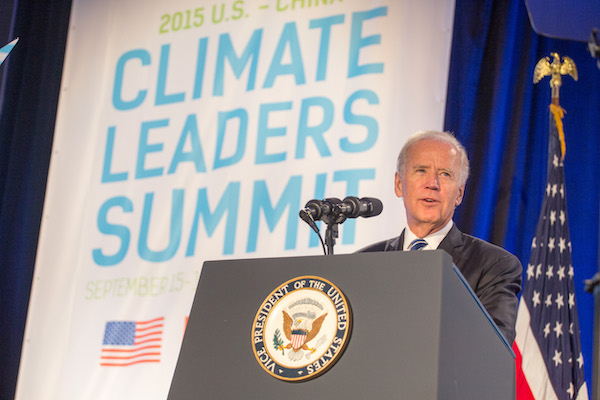
Credit: Official White House Photo by David Lienemann via UN dispatch
Joe Biden’s election victory over Donald Trump has been hailed as an important turning point for all aspects of US policy, and climate change is no exception.
Trump’s presidency was characterised by Climate Home News as a ‘four-year assault on environmental protections’ and included increasing support for fossil fuels, environmental policy rollbacks and a significant retreat from the international community – most notably the Trump administration leaving the Paris climate agreement.
The Climate Deregulation Tracker has documented more than 130 steps the Trump administration has taken to scale back measures to fight climate change.
Trump himself has repeatedly referred to climate change as ‘mythical’, ‘non-existent’ or ‘an expensive hoax’ and even went so far as to say that ‘the concept of global warming was created by and for the Chinese in order to make US manufacturing non-competitive’.
Biden, on the other hand, has called climate change an ‘existential threat’ and appreciates the toll it takes on the most vulnerable Americans, highlighting the desperate need for environmental justice. He has also framed climate change as an opportunity to provide infrastructure jobs across the nation.
Indeed, Biden’s plan to tackle climate change has been described as the most ambitious of any mainstream US presidential candidate the country has seen and the Biden-Harris transition team has already published its climate plan on its website.
Biden hopes to make US electricity production carbon-free and to reach zero net carbon emissions by 2050. Once in office, he plans to spend $2 trillion over four years on upgrading four million buildings to make them more energy efficient as well as investing heavily in public transport and electric vehicle manufacturing.
Like Covid-19, climate change amplifies social injustices and disproportionately harms ethnic minorities and low-income citizens. The Biden Administration has promised that it will take action against companies and polluters who prioritise profit over people and seek to disguise potential environmental and health risks. Furthermore, Biden has assured the US that he will make sure ‘the development of solutions is an inclusive, community-driven process’.
The Biden-Harris proposal will make a federal investment of $1.7 trillion over the next ten years, leveraging additional private sector and state investments to total more than $5 trillion. Biden has committed himself to not accepting contributions from oil, gas and coal corporations or executives. Instead, the expensive Biden plan will be paid for by reversing the excesses of the Trump tax cuts for corporations, ending subsidies for fossil fuels, reducing incentives for evasion and outsourcing, and preventing other tax loopholes that reward wealth, not work.
Despite having control of the senate, some environmental experts worry that not enough Democrats will be willing to pass bold climate change legislation and will expect more modest bipartisan legislation. Many believe Biden will not be capable of implementing his incredibly ambitious plans, yet there is hope that he will be able to take meaningful executive action and forge compromise in the Senate.
Nevertheless, Biden will still most likely have to advance less sweeping climate measures. His desire for clean-electricity generation, for example, could garner some industry support, as legislation that sets federal requirements would make renewable generation easier for utility companies, who currently have to navigate complex and different state requirements for how they use renewable energy.
Although Biden’s ambitious plans will face much opposition and many challenges, they are still incredibly important as they show real commitment to taking climate change seriously. In this sense, perhaps the most significant promise Biden has made is his vow to rejoin the landmark Paris climate agreement as soon as possible. The agreement committed the US and 187 other countries to keep global rising temperatures to below 2°C above pre-industrial levels.
Just as Biden’s plans may not come to full fruition, environmental law professor Michael Gerrard has criticised the Paris Agreement for having ‘virtually no specifics on what the US had to do’. However, he acknowledges that Trump’s withdrawal from the agreement was ‘terrible symbolically’ as it exposed the lack of trust the US government had in climate science, their reluctance to collaborate internationally and their disregard for the future of our planet.

Credit: Julia DeSantis/Flickr
Rejoining the Paris Agreement is incredibly important for two major reasons. Firstly, having the US, China, the EU, Japan and South Korea – two thirds of the world economy and over 50% of greenhouse gas emissions – committed to tackling climate change will greatly increase the likelihood of meeting the Paris targets.
In 2018, UN scientists clarified just how much of a difference further limiting temperature increases to 1.5°C would make. It could limit the chances of an ice-free Arctic in summer, prevent small island states from sinking beneath the ocean and avoid the occurrences of devastating instances of extreme weather.
Bill Hare, who is part of the Climate Action Tracker, which monitors carbon cutting plans, has declared that for the first time ever the Paris Agreement goals are within striking distance in what ‘could be a historic tipping point’.
Biden could also have the US rejoin the World Health Organisation, which helps address public health risks from global warming and he could use trade deals and other international agreements to pressure countries into reducing their own greenhouse gas emissions.
Secondly, the willingness of the Biden Administration to work collaboratively shows that the US trusts and believes in climate science. Dan Costa, who worked at the Environmental Protection Agency for more than 30 years, has said that he noticed an ‘anti-science stance’ once the Trump administration took over.
Climate change denial has increasingly become more of an issue, with journalist George Monbiot asserting that ‘there is no point in denying it: we’re losing. Climate change denial is spreading like a contagious disease’. Biden, however, could be the vaccine we desperately need to stop this ‘disease’ and inhibit the denial and distortion of climate science.
There is hope that Biden will be able to remove climate deniers, fossil fuel lobbyists and oil executives from the positions of power in federal agencies which Trump granted them. Furthermore, scientists are becoming increasingly optimistic that Biden will be able to end the suppression of scientific reports and restore the government’s reliance on scientific experts.
Biden will now need to develop a climate pledge and present it to the world at the upcoming conference in Glasgow, where countries are due to update their commitments for the first time since 2015. Biden’s plans to engage globally and collaborate internationally will have incredibly significant consequences, which will place us in good stead to tackle climate change in the right way.
Biden’s ambitious commitment to tackle climate change is destined to shape the future of climate change positively, but perhaps the most exciting change we can look forward to once Biden comes into office is a government who is committed to following climate science and allowing it to guide policy.
